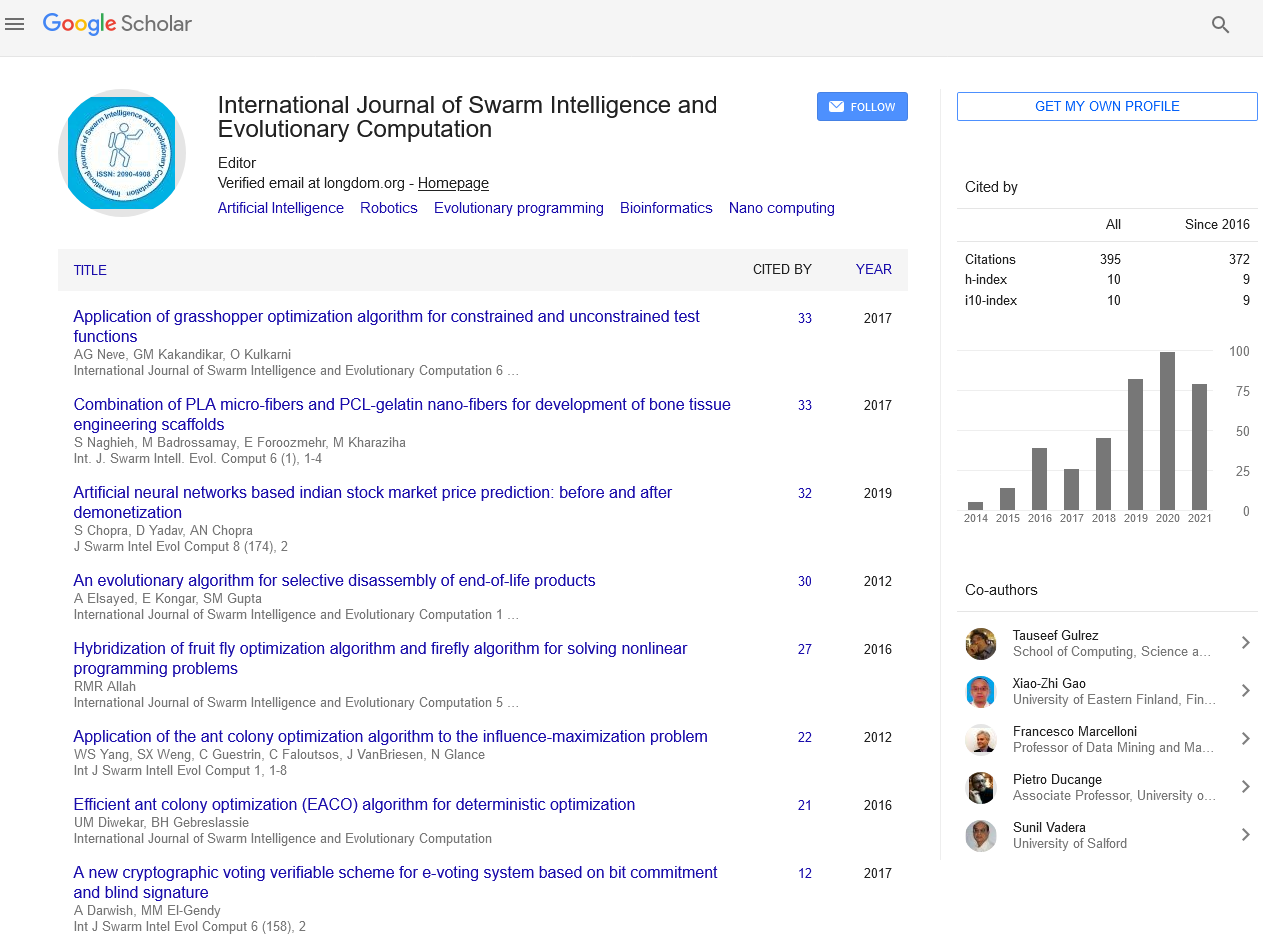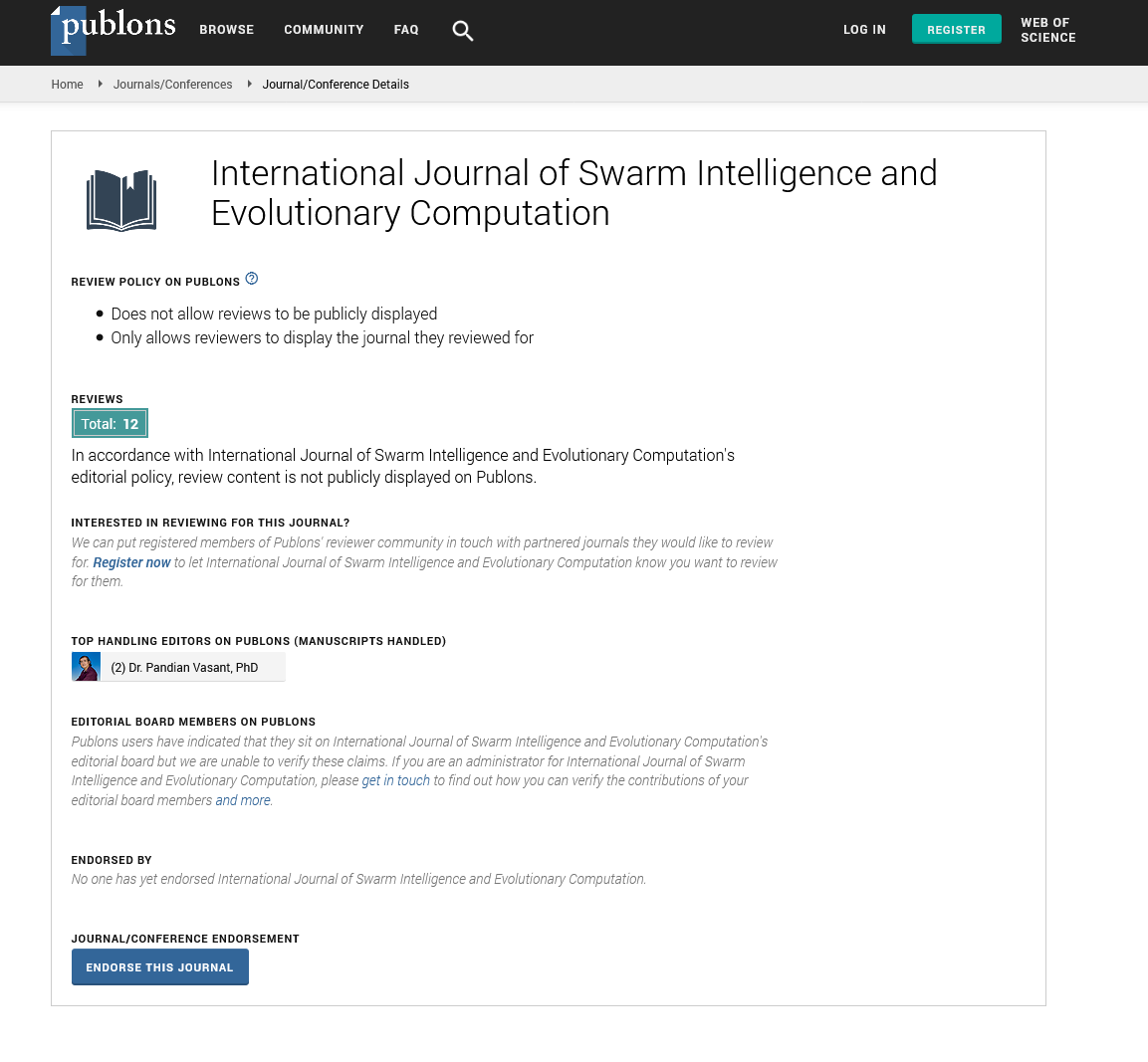Indexed In
- Genamics JournalSeek
- RefSeek
- Hamdard University
- EBSCO A-Z
- OCLC- WorldCat
- Publons
- Euro Pub
- Google Scholar
Useful Links
Share This Page
Journal Flyer

Open Access Journals
- Agri and Aquaculture
- Biochemistry
- Bioinformatics & Systems Biology
- Business & Management
- Chemistry
- Clinical Sciences
- Engineering
- Food & Nutrition
- General Science
- Genetics & Molecular Biology
- Immunology & Microbiology
- Medical Sciences
- Neuroscience & Psychology
- Nursing & Health Care
- Pharmaceutical Sciences
Commentry - (2024) Volume 13, Issue 5
Modeling Emergent Behavior for Large-Scale Optimization Problems
Nguyen Kwok*Received: 26-Aug-2024, Manuscript No. SIEC-24-27461; Editor assigned: 28-Aug-2024, Pre QC No. SIEC-24-27461 (PQ); Reviewed: 11-Sep-2024, QC No. SIEC-24-27461; Revised: 18-Sep-2024, Manuscript No. SIEC-24-27461 (R); Published: 25-Sep-2024, DOI: 10.35248/2090-4908.24.13.394
Description
Optimization problems often involve finding the best solution from a set of possible options. While classical optimization techniques have proven successful in many domains, large-scale optimization problems such as those found in logistics, finance, and machine learning present unique challenges. Traditional methods can struggle to find optimal solutions in complex, highdimensional spaces, especially when the search space is vast and includes nonlinear, multi-objective, or dynamic elements.
Emergent behavior, a phenomenon where complex patterns or outcomes arise from simple local interactions, can offer an alternative approach for tackling large-scale optimization problems. By supporting the principles of emergent behavior, optimization algorithms can control the power of decentralized, self-organizing processes to find efficient solutions, even in highly complex systems.
Understanding emergent behavior in optimization
Emergent behavior refers to the spontaneous development of complex patterns or global behaviors from the interactions of simpler agents or components. These patterns are not explicitly programmed but arise from the interactions and feedback loops that occur between individual agents within a system. Examples of emergent behavior can be observed in nature flocking birds, traffic patterns, and swarm intelligence in ants or bees all exhibit emergent properties, where local interactions lead to global coordination and problem-solving.
In the context of optimization, emergent behavior can be used to model how large systems with numerous interacting components can collaboratively find solutions without centralized control or explicit coordination. Instead of relying on predefined rules or structures, emergent optimization algorithms enable individual agents to explore and adapt to the solution space by responding to local information and interactions with other agents.
Applying emergent behavior to large-scale optimization
Emergent behavior has found practical applications in solving large-scale optimization problems, particularly in fields where traditional methods struggle due to the complexity of the problem. One of the most notable approaches is Swarm Intelligence, which is based on the collective behavior of decentralized agents such as ants, bees and birds. Techniques such as Particle Swarm Optimization (PSO) and Ant Colony Optimization (ACO) rely on emergent behavior to explore large, high-dimensional search spaces and find near-optimal solutions.
These emergent algorithms are particularly well-suited for largescale optimization problems where the solution space is too vast for traditional methods like gradient descent or branch-andbound to explore efficiently. Swarm-based approaches enable the algorithm to examine multiple solutions in parallel, increasing the chances of finding a global optimum.
One of the biggest challenges in large-scale optimization is ensuring that the solution process can scale effectively as the problem size increases. Emergent behavior allows decentralized systems to scale easily by enabling individual agents to operate independently, yet still coordinate and work together towards an optimal solution. This parallel processing approach makes emergent algorithms well-suited for large datasets and complex problem spaces.
Emergent systems are often more robust to changes in the environment or unexpected obstacles. Because the system is decentralized, if one part of the system fails or behaves unpredictably, the remaining agents can continue functioning without a significant loss in performance. This robustness is difficult in real-world applications where conditions may change dynamically, such as in traffic management or supply chain optimization.
One of the most common applications of emergent behavior is in supply chain optimization, where companies must make decisions about inventory management, logistics, and distribution. Swarm intelligence techniques like ACO have been applied to optimize delivery routes, warehouse management, and inventory levels, ensuring timely deliveries and cost reductions.
Emergent algorithms have also been applied to optimize network traffic and resource allocation in telecommunications and computing networks. For instance, algorithms based on PSO have been used to optimize routing protocols in networks, improving efficiency by reducing latency and maximizing throughput. These techniques help adapt to varying traffic conditions, ensuring that networks remain optimized despite fluctuations.
In machine learning, large-scale optimization problems often involve tuning the hyperparameters of algorithms. Techniques like Particle Swarm Optimization can be used to search for optimal hyperparameter values that minimize error and improve model performance. Swarm-based optimization methods are particularly effective in analyzing high-dimensional parameter spaces, which are common in deep learning models.
Modeling emergent behavior for large-scale optimization problems provides an innovative approach to solving complex challenges across various domains. By simulating the decentralized, adaptive and self-organizing characteristics of natural systems, algorithms can explore vast solution spaces, adapt to changing conditions and find high-quality solutions. As these algorithms continue to evolve, they will play an increasingly important role in fields such as logistics, network optimization, machine learning and more, offering scalable and robust solutions to some of the world’s most complex optimization problems.
Citation: Kwok N (2024). Modeling Emergent Behavior for Large-Scale Optimization Problems. Int J Swarm Evol Comput. 13:394.
Copyright: © 2024 Kwok N. This is an open-access article distributed under the terms of the Creative Commons Attribution License, which permits unrestricted use, distribution, and reproduction in any medium, provided the original author and source are credited.


